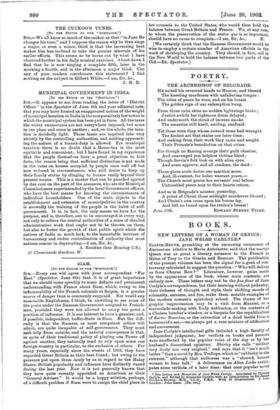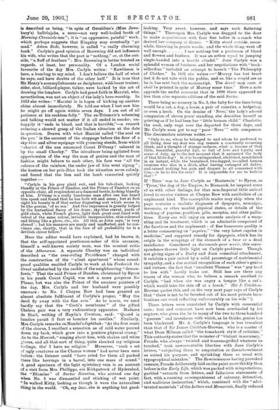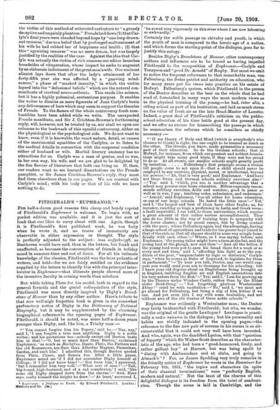BOOKS.
NEW LETTERS OF A WOMAN OF GENIUS:
JANE WELSH CARLYLE.* SAINTE-BEIIVE, grumbling at the unceasing recurrence of discussions relative to Marie Antoinette, said that the martyr Queen was as great a literary nuisance to the French as Helen of Troy to the Greeks and Romans. The publication of the present volumes has been the signal for a gush of con- troversy calculated to suggest the question : "Who will deliver us from Cheyne Row ? " Literature, however, gains much by the appearance of the book, whose main contents, are entirely new. These letters may not be the fine fieur of Jane Carlyle's correspondence, but their learning without pedantry, their richness of thought and style, their shifting moods of solemnity, sarcasm, and fun, make them notable examples of the modern romantic epistolary school. The theme of her graphic improvisation may be a visit from Mazzini, or a marmalade-making with Lady Ashburton, or the contents of a Chelsea butcher's window, or a bargain for the republication of Sartor Resartus, or the extraction of a dead beetle from a housemaid's ear,—we always get a rare mixture of edification and amusement.
Jane Carlyle's intellectual gifts included a high faculty of independent judgment; her verdicts on books and persons were unaffected by the popular voice of the day or by her husband's dissentient opinions. Shirley she calls "neither very lively nor very original," and says that it "isn't much better "than a novel by Mrs. Trollope, which is "rubbishy in the extreme," although that authoress was a "shrewd, honest woman to hear talk." A deliverance on Alton. Locke antici- pates some verdicts of a later time : that once popular novel • New Letters and Memorials of Jane Welsh Carlyle. Annotated by Thomas Carlyle. and Edited by Alexander Carlyle, with an Introduction by Sir June* Crichton-Browne M.D.. LL.D., F.H.B. With 16 Illustrations. 2 role.
London : John Lime. [25a. net.]
its described as being, "in spite of Geraldine's (Miss Jews- bury's) hallelujahs, a mere—not very well-boiled broth of Morning-Chronicle-ism"; it is "an oppressive, painful" work, which perhaps suggests that Kingsley may eventually "go mad." Adam Bede, however, is called "a really charming
book." Carlyle's good opinion of Browning did not influence his wife, who writes that the poet is "nothing," or, at the out- side, "a fluff of feathers " : Mrs. Browning is better treated as regards, at least, her personality. Of a London social favourite of the day Mrs. Carlyle writes : " Rawlinson is here, a humbug to my mind. I don't believe the half of what he says, and have doubts of the other half." It is true that Sir Henry's accomplishments as decipherer, wild-beast trainer, rider, shot, billiard-player, talker, were backed by the art of drawing the longbow. Carlyle bad great faith in Mazzini, who, nevertheless, was not an object of the lady's hero-worship. In 1853 she writes : " Marzini is in hopes of kicking up another shine almost immediately. He told me when I last saw him he might go off again within seven days. I am out of all patience at his reckless folly." The ex-Triumvir's scheming and talking would not matter if it all ended in smoke; un- happily it "ends in blood, and that is horrible,"—a remark evincing a shrewd grasp of the Italian situation at the date in question. Drawn with what Mazzini called "the soul on the pen" is the account of the stoppage before the door of a sky-blue and silver equipage with prancing steeds, from which "chariot of the sun emanated Count D'Orsay ! ushered in by the small Chorley." The introducer being agitated from
apprehension of the way the man of genius and the man of fashion might behave to each other, his face was "all the colours of the rainbow, the under jaw of him went zigzag " ; the hostess on her prie-Dieu took the situation more calmly, and found that the lion and the lamb consorted quietly together :— "Carlyle in his grey plaid snit, and his tub-chair, looking blandly at the Prince of Dandies, and the Prince of Dandies on an opposite chair, all resplendent as a diamond beetle, looking blandly at him. D'Orsay is a really handsome man after one has heard him speak and found that he has both wit and sense ; but at first sight his beauty is of that rather disgusting sort which seems to be like genius, •• of no sex.' And this impression is greatly helped by the fantastical finery of his dress; sky-blue cravat, yards of gold chain, white French gloves, light drab great coat lined with velvet of the same colour, invisible inexpressibles, skin-coloured and fitting like a glove, etc., etc. All this, as John says, 'is very absurd' ; but his manners are manly and unaffected, and he con- vinces one, shortly, that in the face of all probability he is a devilish clever fellow."
Here the editor would have explained, had he known it, that the self-appointed gentleman-usher of this occasion, himself a well-known society man, was the musical critic of the Athenaum. A separate Chorley was an individual
described as "the over-ruling Prcvidence " charged with
the construction of the "silent apartment" whose sound- proof qualities enabled Carlyle to work at his Frederick the Great undisturbed by the cackle of the neighbouring "demon- fowls." That the said Prince of Dandies, christened by Byron in his youth Count Cupid, was not a more gorgeous Sir Plume, but was also the Prince of the amateur painters of the day, Mrs. Carlyle and her husband were possibly unaware : to No. 5 Cheyne Row had been granted an
almost absolute fulfilment of Carlyle's prayer, "May the devil fly away with the fine arts." As to music, we need hardly say that the " Corti's membrane" of the gifted
Chelsea pair was a very rudimentary apparatus. Madame de Stael, writing of Haydn's Creation, said : " Quand la lumiere parait ii faut se boucher les oreilles." Similarly, Mrs. Carlyle remarks on HandersJeplithah "At the first crash of the chorus, I recollect a sensation as of cold water poured down my back, which grew into a positive physical cramp." As to the Messiah," singing about him, with shakes and white gloves, and all that sort of thing, quite shocked my religious feelings, tho' I have no religion." Moreover, "such a set of ugly creatures as the Chorus women" had never been seen
before : the listener could "have cried for them all packed there like herrings in a barrel, into one mass of sound."
A good specimen of the light epistolary vein is an account
of a visit from Mrs. Phillipps, nee Kirkpatrick of Hyderabad, the "Blumine" of Sartor Resartus, who arrived one day
when No. 5 was dismantled and stinking cf wet paint.
"In walked Kitty, looking as though it were the naturallest thing in the world. 'Oh, my dear, she is anything but good-
looking. Very sweet, however, and says such flattering things.'" Thereupon Mrs. Carlyle was dragged to the door to make acquaintance with four fine ladies in a coach who desired her company at dinner. "Kitty stood outside, mean-
while, throwing in gentle words ; and the whole thing went off well enough I saw nothing but a profusion of blond and flowers and feathers. It was an action equal to jumping
single-handed into a hostile citadel." Jane Carlyle was a splendid woman of business, and her negotiations with " book- sellerdom " included an attempt to launch "The Philosophy of Clothes." In 1831 she writes :--" Murray has lost heart lest it do not take with the public, and so, like a stupid ass as
he is, has sent back the manuscript. The deevil may care, it shall be printed in spite of Murray some time." Here a note appends the useful comment that in 1898 there appeared no less than nine separate editions of the said Sartor.
There being no nursery in No. 5, the baby for the time being
would be a cat, a dog, a horse, a pair of canaries, a hedgehog, or even a leech. On the demise of 'Nero,' the lady's adored companion of eleven years' standing, she describes herself as grieving as if he had been her "little human child." Charlotte,
the cook, only wept over the departed for three days, and
Mr. Carlyle soon got to say "poor Nero ' " with composure. The disconsolate mistress writes :— "Only to me, whom he belonged to and whom he preferred to all living, does my dear wee dog remain a constantly recurring blank, and a thought of strange sadness, what is become of that little, beautiful, graceful Life, so full of love and loyalty and sense of duty, up to the last moment that it animated the body of that little dog ? Is it to be extinguished, abolished, annihilated in an instant, while the brutalised, two-legged, so-called human creature who dies in a ditch, after having outraged all duties, and caused nothing but pain and disgust to all concerned with him,—is he to live for ever? It is impossible for me to believe that ! "
If 'Nero' was to Jane Carlyle as ' Boatswain ' to Byron, as Tyres,' the dog of the Empire, to Bismarck, he inspired some of us with other feelings, for that non-Imperial little animal loved to receive visitors at Cheyne Row with assiduities of an unpleasant kind. The susceptible reader may skip when the page contains a realistic diagnosis of dyspepsia, neuralgia, insomnia, or other morbid physical states, or details of the working of pepsine, poultices, pills, morphia, and other pallia- tives. Every one will enjoy an accurate analysis of a wasp- sting and its treatment, which is an admirable compound of the facetious and the unpleasant : of fine humorous quality is a letter commenting on "pcpsien," "the very latest caprice in medicine," and supposed remedy for dyspepsia, which has its origin in the scrapings of the stomach of a bear or a dead malefactor. Considered as documents pour seroir, this corre- spondence throws little light on Carlyle problems. Though not giving signs of a Darby and Joan connubial attachment,
it exhibits a pair united by a solid percentage of matrimonial sympathy, and a due mutual recognition of each other's genius and virtues : the fact that "excellent Thomas" was " gey hard to live with" hardly leaks out. Still less are there any traces of the woman who, to believe a remark ascribed to Carlyle, "had when she was angry a tongue like a cat's, which would take the skin off at a touch." (Sir J. Crichton- Browne quotes this, and on the very next page says of Carlyle that "there is not to be ferreted out of his most private lucu- brations one word reflecting unfavourably on his wife " !)
These letters were annotated by Carlyle with reverential care ; text and comment have now been overhauled by his nephew, who gives the lie to many of the two to three hundred " guesses " and inventions with which, as be thinks, genius has been blackened. Mr. A. Carlyle's language is less truculent than that of Sir James Crichton-Browne, who is a master of what Dean Milman called "the tomahawk sty le of criticism." This authority states that the monster of "blatant inaccuracy," Froude, who always "twisted and transmogrified whatever be
touched," took unwarrantable liberties with Jane Carlyle's letters, "subjecting them to amputation or disembowelment as suited his purpose, and sprinkling them as usual with
typographical mistakes." The Reminiscences having provoked censure, Froude deliberately laid on the paint more thickly than before in the Early Life, which was packed with misquotations, garbled "extracts from letters, and fallacious statements of fact, with a running accompaniment of calumny, detraction, and malicious insinuation," which, combined with the "adul- terated materials" of the Leiters and Memorials, finally reduced the victim of this method of reiterated caricature to "a grossly deceptive and ungainly phantom." Fronde laid down (1) that Car- lyle's final years were clouded beyond hope by "one long-drawn- out remorse," due to a belief that by prolonged maltreatment of his wife he had robbed her of happiness and health ; (2) that this" agonising remorse" was no mere dream, but was largely justified by the realities of the case. Against the idea that Car- lyle was actually the victim of rich remorse our editor launches broadsides of vituperation, whose impact he seeks to augment by an elaborate indictment of the great man's wife. Our eminent alienist lays down that after the lady's attainment of her forty-fifth year she was affected by a "gnawing mind- cancer," a phase of "masked insanity," in which the victim lapsed into the "delusional beliefs" which are the natural con- .comitants of cerebral neuro-asthenia. This reads like science, but it has a highly polemical, sententious purpose. It enables the writer to dismiss as mere figments of Jane Carlyle's brain any deliverances of hers which may seem to support the theories of Fronde. To the flames of the whole controversy fresh com- bustibles have been added while we write. The unexpected Froude manifesto, and Sir .T. Crichton-Browne's forthcoming reply, will, however, not be treated by us, nor shall we open our columns to the backwash of this squalid controversy, either on the physiological or the psychological side. We do not want to know, even if it is knowable, the exact nature, detail, or causes -of the matrimonial squabbles of the Carlyles, or to listen to the medical details in connection with the corporeal condition either of husband or wife. Morbid literary anatomy has no attractions for us. Carlyle was a man of genius, and so was, in her own way, his wife, and we are glad to be delighted by the fine flavour of literature that both can bring us. If, then, our readers want to see learned dissertations on the Fronde pamphlet, or Sir James Crichton-Brovrne's reply, they must find them elsewhere than in our pages. We are content with Carlyle's mind; with his body or that of his wife we have nothing to do.












































 Previous page
Previous page